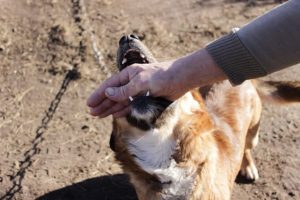Dogs appear fun-loving and provide companionship for many people across the country. However, dogs may also bite a person for various reasons, and since canines generally have a strong bite force, their jaws can inflict significant damage.
You might have to take multiple trips to the doctor and miss work. Like other states, Pennsylvania has laws about dogs and dog attacks. You likely may have the right to seek compensation for your injuries. If you plan to sue a dog owner, have a dog bite lawyer on your side in case of unexpected obstacles.
Pennsylvania’s Rules for Dangerous Dogs

Pennsylvania’s law classifies a dog as dangerous if it severely hurts a person unprovoked. The incident may occur on either public or private property. Severe injuries include disfigurement and broken bones. A dog becomes dangerous if it inflicts injuries on another domesticated animal.
Dangerous dogs typically have a history of attacking people or other pets. They need to show an inclination to harm without provocation. Even dogs who participated in a crime are dangerous under the law. However, police dogs and aid dogs for the disabled may have an exemption to the rule.
If someone owns a dangerous dog, they take on several legal responsibilities. They need to register the animal with the Bureau of Dog Law Enforcement. Pennsylvania has over 600 registered dangerous dogs. A person must pay a fee and needs to renew their pet’s registration every year.
Dangerous canines need to remain in a proper enclosure. Owners can keep them inside their homes or outside in a locked pen or structure. The design of the structure must be able to keep young children out. The animal can only be outside the enclosure if they are on an adequate chain and leash and wear a muzzle.
A person must place a visible warning sign to alert people of the canine’s presence on the property. Owners of dangerous dogs have to purchase a minimum amount of liability insurance in case of an accident. If the animal is on the loose, the individual must alert the local authorities and the State Dog Warden.
When an accident occurs, an owner faces a misdemeanor charge if the court finds them guilty of intentional or negligent behavior. They could face a fine and jail time.
Dog Bite Liability Laws in Pennsylvania
Around 4.5 million people suffer from dog bites every year, and 800,000 individuals require immediate medical attention. In many cases, the victim did not do anything to provoke the animal. Additionally, the owner may not have taken precautions to secure their pet.
In Pennsylvania, the law requires people to confine their dogs on their property. If someone takes their dog out in public, they need to use a collar and leash. If they do not, they could be liable for a dog bite accident. The state allows the victim to sue the owner for compensation.
Pennsylvania has a limited version of the strict liability rule. The owner is legally responsible for the cost of medical treatment for the bite. You usually do not need to prove they were at fault. The law does not require the owner to pay for other damages like pain and suffering for non-severe bites.
Victims of dog bites can pursue additional reimbursement for severe injuries. You have to prove the other party displayed negligence to recover losses like lost income. You would need to show how the owner failed to take the appropriate steps to control their canine.
The defendant is liable if they were aware the dog had violent tendencies. Due to the statute of limitations, you have a specific time to file a claim. A dog bite lawyer can help you with the paperwork and prove negligence.
What Happens if a Dog Bites You at Work?
Several careers might increase the chance of a confrontation between a person and a dog. Mail carriers operate in residential areas, and a painter might work on a home. If a canine manages to escape, an individual could experience an injury on the job.
In Pennsylvania, you can file a workers’ compensation claim if a dog bit you while performing your duties. You can gain reimbursement for any surgeries, medication, or physical therapy. In cases of facial disfigurement and other severe injuries, an employee can obtain special loss benefits.
You might be able to collect additional compensation for damages from the dog owner. You can bring a legal claim against the at-fault party if they are not your employer. Even if the person taking care of the canine was not the owner, you could hold them accountable for negligence.
What to Do After a Dog Bite
Get the Owner’s Information
One of the first steps you should take is to get the owner's information. As with other accidents, you need to get the person's name, contact information, and address. You can contact them later if you decide to file a claim.
You need to ask the owner for details about their dog as well. Details include a history of vaccinations, breed type, and if they registered the canine as dangerous. If you cannot identify the owner, report the incident to animal control.
Locate Any Witnesses
Someone else might have been in the area and saw the bite accident take place. You should collect the contact information of any witnesses who were present. If you need to file a claim later, you can reach out to the person to record their statement.
See a Doctor
After a dog bite happens, you should disinfect the wound immediately. Between 15 percent and 20 percent of bites develop infections. You could suffer from significant tissue or nerve damage. Additionally, a few owners do not vaccinate their pets for diseases like rabies. Visit the doctor’s office or hospital and follow your physician’s instructions to prevent the bite from worsening.
Document the Injury
Another action you should take is to document the dog bite. The details you record can help you build your case if you plan to sue the dog owner for damages. First, you would document the visible wounds the animal caused. Photos effectively show the seriousness of the traumatic event.
If you can't take pictures, have someone you trust hold the camera. Besides photos, you can record details in a journal. Write down the progress of your treatment and the physical and emotional effects of the injury.
Describe the incident while it is fresh in your mind. Do not speak to the other party or the insurance company without a lawyer. If you need to contact them, record any correspondence with them.
Find a Dog Bite Attorney
Many attorneys have experience with dog bite claims. They are familiar with the state’s dog bite laws and can get you an accurate compensation estimate. You can ask someone you know or search online to find a law firm. Schedule a free consultation to know if a dog bite lawyer is right for you.
Can Children Claim Damages in a Dog Bite Claim?
In some cases, the victim of a dog bite incident is a child. Children are less likely to know the signs of an aggressive or scared canine, especially if they are young. As a result, they are more vulnerable to dog bites. Under state law, minors can recover damages related to their physical recovery.
A child can claim reimbursement for various types of medical bills. Compensation can include non-economic damages. Some underaged bite victims and their families have to deal with future expenses. For example, significant scarring can result in further healthcare treatment.
A parent might need to take their child to a mental health clinic for psychological harm. Since children do not have legal authority like adults, the parent is the one to open a claim on their behalf. You can trust a lawyer to help you and your family on the road to recovery.
What if the Dog Owner Is a Friend?
You might find yourself in a situation where the dog owner responsible is a friend or neighbor. Many people do not want to sue someone they know personally. You might be worried about how a lawsuit will affect your relationship with them. At the same time, the accident-related expenses pile up.
The consequences of a bite can last a long time. Regardless of who the person is, an owner is at fault for the animal’s violent actions. However, you would likely not collect money from your friend directly. Instead, you would file a claim against their renters or homeowners insurance company.
Common Defenses in a Dog Bite Lawsuit
Injured victims have the right to file a claim, but dog owners can try to defend themselves in court. The defendant may argue they had a proper fence or enclosure in place. However, the animal managed to escape and hurt someone.
If the plaintiff provoked the dog, the owner might not be liable for damages. The owner might argue the injured person made their pet feel threatened or scared. If they manage to pass fault onto you, you might receive reduced or no compensation.
Another possible defense is if the plaintiff trespassed onto someone’s property. Dog owners usually do not owe an individual a duty of care if the person was there without permission. Additionally, the defendant could escape liability if the plaintiff assumed the risk of injury.
For example, veterinarians can expect a scared pet to react negatively and accept the risk. If the dog owner potentially has a valid defense, you should get a lawyer. An attorney is familiar with the type of tactics the opposing party might use to avoid compensation.
Why You Need a Dog Bite Lawyer
An injured person needs a dog bite lawyer to prove negligence. They need to show the owner is at fault for additional damages like pain and suffering. An attorney can do an in-depth investigation to collect the facts. They know what arguments to make as well.
Your lawyer is familiar with the types of defenses the opposing party might use. They can match the aggressiveness of the defendant. The insurance company might try to interrupt your claim with delays. The adjuster might delay to get you to miss the filing deadline.
In Pennsylvania, the statute of limitations for dog bite lawsuits is two years from the date of the injury. Other matters in your life can take priority, so you should hire a dog bite attorney to submit the paperwork on time. Your lawyer can manage communication and negotiations with the defendant and their insurer.
Calculations for physical and psychological harm can become time-consuming. Additionally, effects like PTSD and emotional suffering do not have a set value. A person might not demand the correct amount of compensation. Lawyers have the experience to determine how much your claim is worth in a settlement.
Should You Accept an Insurer’s Offer?

Like many people, you want to get compensation as swiftly as possible to pay for your medical care. The dog owner’s insurer might call you soon after the incident with an offer. The adjuster is not on your side, and the amount they provide is lower than what you need.
Insurance companies do not like to make huge payments. They know people are vulnerable after an accident and take advantage of their situation. Adjusters hope claimants are willing to resolve the matter quickly and settle.
However, you should not sign any settlement papers until a lawyer reviews the offer. You cannot sue the dog owner if you discover the bite is more serious than you first believed. The forms you sign relieve the defendant of liability for the same injury.
Do not agree to anything until you have hired a lawyer. Your dog bite attorney can fight for every penny the other side owes you.
